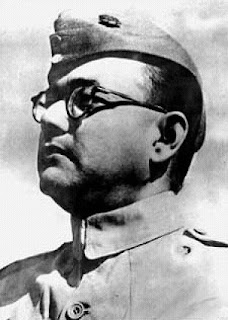Sunday, November 14, 2010
Atlee: Gandhi’s role in UK decision to leave India was MINIMAL
“..Apart from revisionist historians, it was none other than Lord Clement Atlee himself, the British Prime Ministerresponsible for conceding independence to India, who gave a shattering blow to the myth sought to be perpetuated by court historians, that Gandhi and his movement had led the country to freedom. Chief Justice P.B. Chakrabarty of Calcutta High Court, who had also served as the acting Governor of West Bengal in India, disclosed the following in a letter addressed to the publisher of Dr. R.C. Majumdar’s book A History of Bengal. The Chief Justice wrote: ‘ My direct question to him (Atlee) was that since Gandhi’s “Quit India” movement had tapered off quite some time ago and in 1947 no such new compelling situation had arisen that would necessitate a hasty British departure, why did they have to leave.
In his reply Atlee cited several reasons, the principal among them being the erosion of loyalty to the British Crown among the Indian army and navy personnel as a result of the military activities of Netaji [Bose].
Toward the end of our discussion I asked Atlee what was the extent of Gandhi’s influence upon the British decision to quit India. Hearing this question, Atlee’s lips became twisted in a sarcastic smile as he slowly chewed out the word, “m-i-n-i-m-a-l!” ” Subhas Chandra Bose, the Indian National Army, and the War of India’s Liberation – Ranjan Borra, Journal of Historical Review, no. 3, 4 (Winter 1982)
…The Indian Army in India is not obeying the British officers. We have recruited our workers for the war; they have been demobilised after the war. They are required to repair the factories damaged by Hitler’s bombers. Moreover, they want to join their kith and kin after five and a half years of separation. Their kith and kin also want to join them. In these conditions if we have to rule India for a long time, we have to keep a permanent British army for a long time in a vast country of four hundred millions. We have no such army….” Sir Stafford Cripps, intervening in the debate on the motion to grant Indian Indepence in the British House of Commons in 1947 quoted in ‘The Freedom Struggle and the Dravidian Movement’ by P.Ramamurti, Orient Longman, 1987
Nonviolence: Its Histories and Myths
Professor Michael Neumann, Trent University in Ontario, Canada
8 February 2003 in Counter Punch
“…I have neither the moral standing nor the slightest desire to disparage the courage of those who engage in non-violence…. But, non-violence, so often recommended.. has never ‘worked’ in any politically relevant sense of the word, and there is no reason to suppose it ever will. It has never, largely on its own strength, achieved the political objectives of those who employed it… There are supposedly three major examples of successful nonviolence: Gandhi’s independence movement, the US civil rights movement, and the South African campaign against apartheid. None of them performed as advertised. The notion that a people can free itself literally by allowing their captors to walk all over them is historical fantasy…”
Comment by tamilnation.org 1.”…The Indian Army in India is not obeying the British officers. We have recruited our workers for the war; they have been demobilised after the war. They are required to repair the factories damaged by Hitler’s bombers. Moreover, they want to join their kith and kin after five and a half years of separation. Their kith and kin also want to join them. In these conditions if we have to rule India for a long time, we have to keep a permanent British army for a long time in a vast country of four hundred millions. We have no such army….” Sir Stafford Cripps, intervening in the debate on the motion to grant Indian Indepence in the British House of Commons in 1947 quoted in ‘The Freedom Struggle and the Dravidian Movement’ by P.Ramamurti, Orient Longman, 1987
2 “..Apart from revisionist historians, it was none other than Lord Clement Atlee himself, the British Prime Minister responsible for conceding independence to India, who gave a shattering blow to the myth sought to be perpetuated by court historians, that Gandhi and his movement had led the country to freedom. Chief Justice P.B. Chakrabarty of Calcutta High Court, who had also served as the acting Governor of West Bengal in India, disclosed the following in a letter addressed to the publisher of Dr. R.C. Majumdar’s book A History of Bengal. The Chief Justice wrote: ‘ My direct question to him (Atlee) was that since Gandhi’s “Quit India” movement had tapered off quite some time ago and in 1947 no such new compelling situation had arisen that would necessitate a hasty British departure, why did they have to leave? In his reply Atlee cited several reasons, the principal among them being the erosion of loyalty to the British Crown among the Indian army and navy personnel as a result of the military activities of Netaji [Bose]. Toward the end of our discussion I asked Atlee what was the extent of Gandhi’s influence upon the British decision to quit India. Hearing this question, Atlee’s lips became twisted in a sarcastic smile as he slowly chewed out the word, “m-i-n-i-m-a-l!” ” Subhas Chandra Bose, the Indian National Army, and the War of India’s Liberation – Ranjan Borra, Journal of Historical Review, no. 3, 4 (Winter 1982)
Courtesy : Sachin Drafts Face book note
Subscribe to:
Post Comments (Atom)




No comments:
Post a Comment